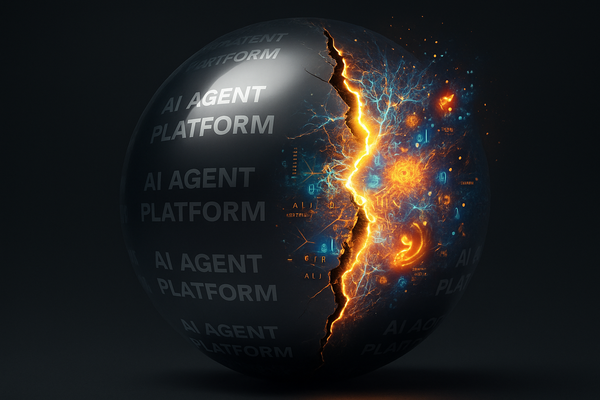Why we're supporting MCP at DoozerAI: The Future of AI Interoperability

In the rapidly evolving landscape of artificial intelligence, a quiet revolution is taking place. While headlines focus on the latest large language models and their capabilities, a more fundamental shift is occurring in how AI systems interact with data, tools, and services. The Model Context Protocol (MCP) represents a significant advancement in how we connect AI models to the world around them.
The AI Landscape is Changing
The AI industry has evolved beyond the simple pursuit of larger models to a more sophisticated understanding of what makes AI truly effective. We're seeing increasing emphasis on specialized capabilities, contextual understanding, and the ability to integrate with external tools and data sources. As models become more capable, the limiting factor is increasingly their ability to access and interact with the information and systems they need.
Understanding Model Context Protocol
At its core, MCP is a standardized way for applications to provide context to LLMs. Think of MCP like a USB-C port for AI applications. Just as USB-C provides a standardized way to connect your devices to various peripherals and accessories, MCP provides a standardized way to connect AI models to different data sources and tools.
"MCP is to AI what HTTP was to the early internet - a fundamental protocol that enables seamless communication and integration."
The protocol follows a client-server architecture where a host application can connect to multiple servers:
- MCP Hosts: Programs like Claude Desktop, IDEs, or AI tools (like DoozerAI) that want to access data through MCP
- MCP Clients: Protocol clients that maintain 1:1 connections with servers
- MCP Servers: Lightweight programs that each expose specific capabilities through the standardized protocol
This architecture is particularly crucial as we see the rise of more sophisticated AI applications that need to work in concert with various data sources and tools for optimal results.
The Technical Foundation of MCP
MCP provides several core capabilities that enable rich AI interactions:
Resources
Resources expose data and content from servers to LLMs. These are designed to be application-controlled, meaning the client application can decide how and when they should be used. Resources can represent any kind of data: file contents, database records, API responses, live system data, and more.
Tools
Tools are server-side functions that clients can discover and execute. These are designed to be model-controlled, allowing the AI model to automatically invoke them (with human approval). This enables LLMs to perform actions like running database queries, accessing external APIs, or manipulating data.
Prompts
Prompts enable servers to define reusable prompt templates and workflows that clients can easily surface to users and LLMs. They provide a powerful way to standardize and share common LLM interactions.
Additional Capabilities
MCP also supports capabilities like Roots (defining boundaries where servers can operate), Sampling (letting servers request completions from LLMs), and multiple Transport mechanisms (STDIO, SSE) for flexible integration.
Real-World Applications
The business implications of MCP are profound. Consider these scenarios:
- Financial Services: Connect LLMs to financial data systems and regulatory compliance tools
- Healthcare: Integrate diagnostic models with patient history analysis and treatment recommendation systems
- Manufacturing: Connect predictive maintenance models with supply chain optimization systems
- Customer Service: Seamlessly transition between general query handling and specialized problem-solving models
"The ability to seamlessly combine different AI capabilities can transform business operations in ways we're only beginning to understand."
MCP in Action: Clients and Servers
MCP already has a growing ecosystem of clients and servers:
Clients
Applications like Perplexity, Claude Desktop, Continue, Cursor, Zed, and many others have implemented MCP support, allowing them to connect to various MCP servers.
Servers
There are hundreds of available MCP servers already providing capabilities like:
- File system access
- Database connections (PostgreSQL, SQLite)
- Web search and content fetching
- Git and GitHub integration
- Slack messaging
- Google Maps location services
- Image generation
Each of these servers can be easily connected to any MCP-compatible client, creating a flexible ecosystem of AI capabilities.
The Business Advantages
Adopting MCP-enabled solutions offers several key benefits:
- Cost Optimization: Use expensive reasoning models only when necessary, while leveraging lighter models for routine tasks
- Enhanced Flexibility: Easily integrate new AI capabilities as they become available
- Improved Performance: Combine the strengths of different models for optimal results
- Future-Proofing: Adapt to new AI architectures and capabilities without major system overhauls
- Privacy and Security: Maintain data control while leveraging both cloud and edge-deployed models
Looking to the Future
The MCP roadmap for the first half of 2025 includes ambitious goals:
- Remote MCP Support: Enabling secure connections over the internet with standardized authentication and service discovery
- Reference Implementations: Providing comprehensive client and server examples
- Distribution & Discovery: Creating standardized packaging and installation tools for MCP servers
- Agent Support: Expanding capabilities for complex workflows with hierarchical agent systems and interactive workflows
Conclusion
The future of AI isn't just about individual models - it's about how these models work together with data and tools to create solutions greater than the sum of their parts. With MCP, that future is becoming a reality today. By embracing MCP now, businesses can position themselves at the forefront of this transformation.
The Model Context Protocol represents a fundamental shift in how we build AI systems - moving from isolated models to connected ecosystems of capabilities. As this standard continues to evolve and gain adoption, we'll see increasingly sophisticated AI applications that can seamlessly leverage the full spectrum of available data and tools.




